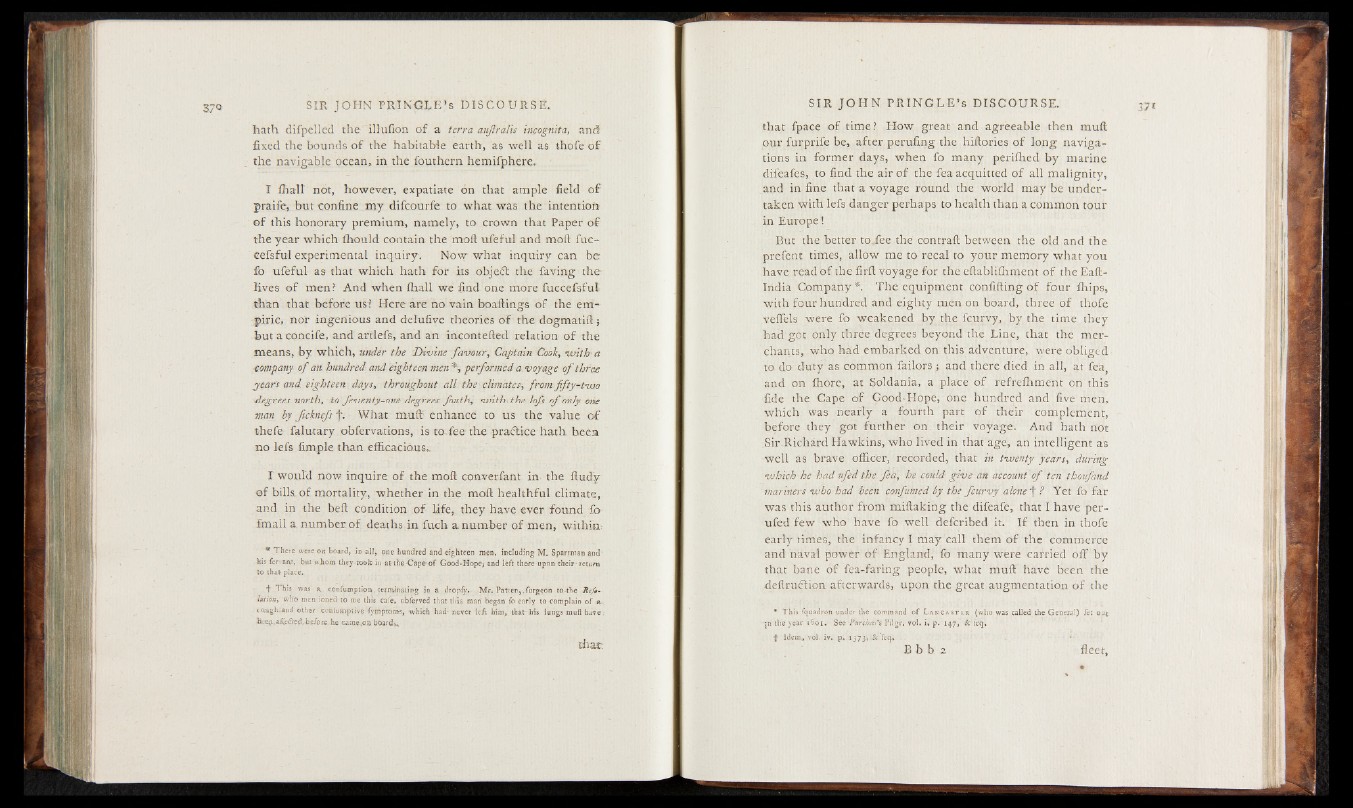
hath difpelled the illufion of a terra aujlralis incognita, and
fixed the bounds of the habitable earth, as well as thofe of
the navigable ocean, in the fouthern hemifphere.
I fliall not, however, expatiate on that ample field of
praife, but confine my difcourfe to what was the intention
e f this honorary premium, namely, to crown that Paper of
the year which fhould contain the molt ufeful and mod fuc-
cefsful experimental inquiry. Now what inquiry can be
& ufeful as that which hath for its objedi tire faving the
lives of men! And when fhall we find one more fuccefsful
than that before us? Here are no vain boaftings of the empiric,
nor ingenious and delufive theories of the dogmatift;
but a concife, and artlefs, and an incontefted relation of the
means, by which, under the Divine favour, Captain Cook, ■ with-a
company of an hundred and eighteen men *, performed a. voyage of three
years and eighteen days, throughout all the climates^ from fifty-two
degrees north, to feventy-one degrees fouth^ with'the lofs of only one
man by ficknefs f. What mu ft- enhance to us thé value of
thefe falutary obfervations, is to fee the practice hath been
no lefs Ample than efficacious-
P would now inquire of the molt convetfant in the ftudy
o f bills of mortality, whether in the moll healthful climate,
and in the beft condition of life, they have ever found fo
fmall a number of deaths in fuch a number of men, within
* ‘There were oa board, in all, one hundred and eighteen men, including M. Sparrman and'
his fertajvr, bux whom they-took- in at-tfte-Cape* of Good-Mopej and left there upon their-return
to that-place.
■ f This was a. confgmption. terminating in a dropfy. .Mr. Patten,.furgeon to.-the Reji-
iutiön, who mentioned to me this cafe, obferved that this man began fo early to complain of a.
< augh-and other canlumptive fym-proms, which had* never left him, that*his lungs muft have;
h'.'£4j..ail'e<üed.liefore. he. camera boards
that fpace of time? How great and agreeable then muft
our furprife be, after perilling the hiftories of long navigations
in former days, when fo many perifhed by marine
difeafes, to find the air of the fea acquitted of all malignity,
and in fine that a voyage round the world may be undertaken
with lefs danger perhaps to health than a common tour
in Europe!
But the better to.fee the contrail between the old and the
prefent times, allow me to recal to your memory what you
have read of the firft voyage for the eftablilhment of the Eaft-
India Company *. The equipment confining of four fhips,
with four hundred and eighty men on board, three of thofe
veflels were fo weakened by the fcurvy, by the time they
had got only three degrees beyond the Line, that the merchants,
who had embarked on this adventure, were obliged
t& do duty as common failors ; and there died in all, at fea,
and on fhore, at Soldania, a place of refrelhment on this
fide the Cape of Good-Hope, one hundred and five men,
which was1 ‘nearly a fourth part of their complement,
before they got further on. their voyage. And hath riot
Sir.Richard Hawkins, who lived in that age, an intelligent as
well as brave officer, recorded, that in twenty years, during
which he had ufed the fed, he could give an account of ten thoufand
mariners who had been confumed by the fcurvy alone j- ? Yet fo far
was this author from miftaking the difeafe, that I have per-
ufed few who have fo well defcribed it. If then in thofe
early times, the infancy I may call them of the commerce
and naval power of England, fo many were carried off by
that bane of fea-faring people, what muft have been the
deflrudlion afterwards, upon the great augmentation of the
* This fquadron under the command of L ancaster (who was called the General) Set out
- jn the year 1601. See Purchases Pilgr. vd. i. p. 147, & leq,
f idem* vol. iv. p. I373V& feq.
Bbb. 2 fleet,